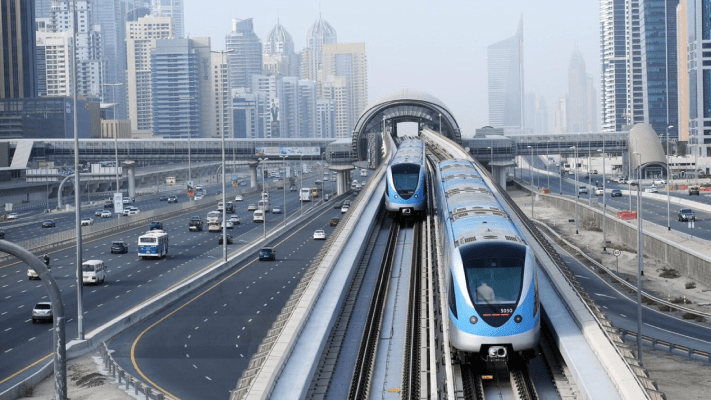Dubai's Metro service is set to expand by providing more stations for commuters over the coming few years after a development plan was approved on Sunday by the emirate's Executive Council.
The expansion aims at increasing the currently operating 64 stations over 84 square kilometres to 96 stations over 140 square kilometres by 2030. It aims to cover 140 stations over 228 square kilometres by 2040.
This plan comes under the vision of Sheikh Mohammed bin Rashid Al Maktoum and Sheikh Hamdan bin Mohammed Al Maktoum.
Some of the key goals include increasing the share of public transport to 45 per cent, reducing carbon emissions to 16 tonnes per capita, improving the quality of public spaces to encourage walking and increasing shaded areas.
These are aimed at developing areas around Metro stations with the aim of enriching economic opportunities, interconnecting modes of public transport, and improving efficiency and convenience of sustainable transport.
It will also provide incentives for developers, offer services that will support the '20-minute city' concept and increase the number of commuters.
Foreign Direct Investment Plan
In addition to the Metro development plan, the council approved the Foreign Direct Investment Development Programme, which aims to attract Dh650 billion of investments to Dubai by 2033.This includes international companies and aims at supporting the expansion of existing international companies with bases in Dubai.
The initiative will be carried out by designating Dh25 billion over 10 years in direct support of the city's plans, placing it among the world’s top three economies by 2033.
The FDI programme will highlight Dubai’s competitive advantages, such as its logistics infrastructure, strategic geographical location, talent pool, and its position as a global commercial hub.
Dubai's economic model
In addition to the foreign direct investment plan, the council also approved the Dubai Economic Model to measure Dubai’s development against its economic targets through an economic database that includes more than 3,000 indicators to enhance consumer and investor confidence.
Sheikh Maktoum said: “The success of any economic model always starts with empowering the individuals as they are the ultimate beneficiary. Dubai is a diverse global city and an international commercial hub synonymous with vitality, diversity, and peaceful coexistence owing to the principles it upholds. At the same time, it maintains its core values and national identity by investing in people and launching initiatives to achieve the goals of Dubai's Social Agenda 33, which fosters happy, strong and tolerant families who are proud of their values and identity.”
Manbar programme
For UAE nationals, the council approved the 'Manbar' programme, which aims at doubling the number of Emiratis working in mosques and equipping them with the necessary skills and qualifications. These will include delivering prayers, call to prayer and performing the Friday prayer.
Citizens will be provided with all the training they need, in addition to opportunities to sponsor and train students for permanent appointments. All participants are comprehensively evaluated beforehand and until their graduation.
Ghras Al Khair programme
The 'Ghras Al Khair' programme was launched to empower Emirati content creators and promote values of tolerance, harmony, cohesion and moderation in a way that strengthens national identity.
Schools and universities will offer programmes and awareness campaigns for the same.


